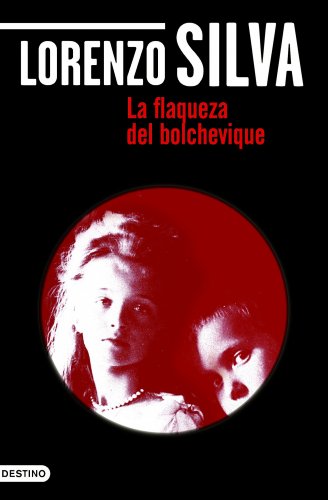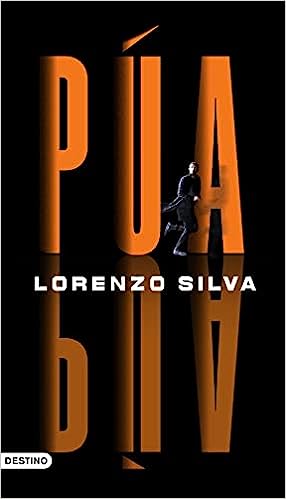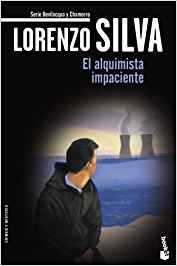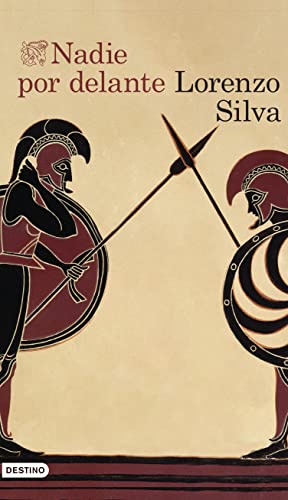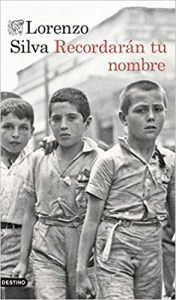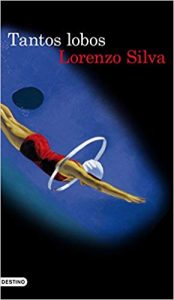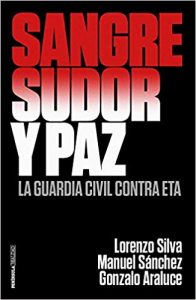One of the most popular writers lately on the Spanish literary scene is Lorenzo Silva. In recent years This author is publishing books of a very different nature, from historical novels such as They will remember your name even documentaries like Blood sweat and peace. Without forgetting his regular dedication to the noir genre.
Beyond his creative variety, it is worth remembering those origins of the author, where he began to stand out for his ingenuity and freshness. With Lorenzo Silva a black genre emerged with a particular stamp. The inner substance, November without violets and especially The Bolshevik's weakness were works that knocked on the doors of the national narrative and through which many readers were enthralled with their proposals.
A noir genre, almost always moving in a gray world of social and political mediocrity, capable of turning the villain into a hero. A context where that traditional noir with very close idiosyncrasy and easily exportable with the indigenous genre label becomes even more intense. Something like what it was Camilleri o Vazquez Montalban.
La Bibliography of Lorenzo Silva is being extensive and diverse enough to consider the task of opting for 3 of his best novels difficult way, but here I go.
Top 3 recommended novels of Lorenzo Silva
The Weakness of the Bolshevik
In my understanding this was the novel that caught the attention of the readers. The bad guy, the wicked guy, the murderer born of chance. A traffic accident leads anyone to the entire government of evil.
A way of presenting us with this worldly evil, capable of emerging from boredom, despair, an inferiority complex or any other attitude that leads to the annulment of the will to be ... The protagonist and narrator of this story crashes against the convertible of a annoying executive on a Monday morning at eight.
He was certainly distracted a bit, but she didn't have to stop dead, and she certainly didn't have to spit every insult in the dictionary at him. For this reason, and to make the afternoons of that muggy summer bearable, she decides to dedicate herself "to the stalking and moral annihilation of Sonsoles."
Thanks to the insurance part, he gets his phone number, which allows him several crazy calls. He also takes pleasure in spying on her, and thus meets his 15-year-old sister. Although the protagonist has no fixation on young girls, he still has a portrait of the daughters of Tsar Nicholas II. He is especially attracted to Duchess Olga and often wonders what the Bolshevik in charge of killing her must have felt.
He, in turn, will experience a powerful attraction to Rosana's warm wisdom, and a weakness that will reveal itself far worse than any accident. The Weakness of the Bolshevik would be an absolutely comical novel were it not for the disturbing character it acquires as the protagonist's tricks become more complicated.
An agile pace allows Lorenzo Silva a story halfway between comedy, intrigue and melodrama. But perhaps his greatest achievement is the portrait of Rosana, a nymphet different from all nymphs, beyond generation X, Y or Z and that makes the most complacent reader falter - and lose his balance.
Brand Meridian
Planeta Prize 2012. When I go to Catalonia, crossing the Monegros, one of the borders that most impresses me appears. This is just a scientific convention. But that of the Greenwich meridian that is announced on the respective poster seems to me at the door of Tannhauser.
In this novel it ends up being something similar, Barcelona as a transformed city under the prism of fiction. In a society debased by dirty money and the prostitution of people, love can still soften the beasts.
A retired civil guard is found hanging from a bridge, murdered in a humiliating way. From that moment on, the investigation to be carried out by his old friend and disciple, the Bevilacqua brigade, will open Pandora's box: police corruption, unscrupulous criminals and a quixotic man who will seek the impossible in duty and love. redemption from a fractured life.
Set in present-day Catalonia, this absorbing crime novel by Lorenzo Silva, undisputed master of the genre, he delves beyond the facts and presents a solid portrait of the human being in the face of moral doubt, inner combat and wrong decisions.
Spike
From The Weakness of the Bolshevik one could already guess in Lorenzo Silva to the narrator of black gender more unique. Because Silva enjoys that complete integration between reader and character, that head-to-toe costume achieved with a subjective notion that immediately blends in with us. From the first dialogue or the first presentation of the world according to the protagonist of the moment. Getting make us live as mischievous or Machiavellian beings has its one. His justifications always make sense in Silva's hands, his animosities always have support.
"Whoa, it's me. I have little left. I need you."
With this unexpected message, the past returns to shake the life of a former secret agent when he no longer has his organization's shield. He participated in the dirty war of the State, convinced of his cause: the defense of a democratic society and innocent victims against terrorist violence. But time has passed, not everything worked out and the justification is far away, while he can no longer leave the dark side. The cryptic communication he just received claims him again.
Bedridden in the hospital, Mazo needs his old comrade Púa to help him in a very personal mission that he can no longer assume. Her daughter is in danger and he has to take her away from the life she leads from her and from those around her, whatever it costs her. Only someone like Púa is capable of going to the end to achieve it. The call of his friend brings him back to the days on the edge, the memory of his deeds and the shadows of his own nature.
Other recommended books Lorenzo Silva
The impatient alchemist
More of a crime novel Marca Silva and his alter ego Bevilacqua. A naked corpse, without traces of violence, appears tied to a bed in a roadside motel. Is it a crime or not? Sergeant Bevilacqua, an atypical criminal investigator of the Civil Guard, and his assistant, the Chamorro guard, are ordered to solve the enigma. The investigation that follows is not a mere police investigation.
The sergeant and his assistant must get to the dark and shameful side of the victim, to her surprising secret life, as well as to the people around her, in her family, at the nuclear power plant where she worked. And unravel an increasingly complex network of money and interests that will take them to various cities.
But the key, as in alchemy, is in patience; the one that the investigators will need and also the one that the characters they encounter in their search lacked, in one way or another. A detective novel that is much more than a story of intrigue, and in which discovering the victim is almost more important than discovering his murderer.
As in the books by Chandler and Hammett, it is not about solving a crime like someone who solves a riddle, but rather that you have to immerse yourself in the circumstances and characters that surround death, in its social background.
no one ahead
Of each kind of story that structures this work of Lorenzo Silva a diffuse ending is presented, as of a more extensive work that is lost in a mist on the horizon. And it is that the narrations inspired by real events are prolonged like echoes that invite the reader to project more lasting frameworks. Wisdom of an author who composes the furious plots of his life.
Alicante, July 2002. Jorge, alias Ruina, is at a Estopa concert when he receives a notice: the Moroccans have taken the Perejil islet and he, a young sergeant, is mobilized to prepare the operation to recover it. Along with Jorge and his three companions, we will experience the assault on the islet, which reveals the existence of the elite unit to which they belong and which is only the preamble to twenty years of operations. From the battle of Najaf, in Iraq in 2004, to the dangerous and compromised evacuation of the Kabul airport in 2021, in which the protagonists are the young people whom Jorge and his companions take over and who, already mature and at edge of retreat, they have to settle for watching from a distance.
A set of fictional stories inspired by real events, of high intensity, starring those who apply to be in that uncomfortable place where no one is ahead.
They will remember your name
As in any war or tragic event, the moment always comes when fiction, literature in this case, begins to participate in this process of assimilation of what not so long ago was a drama for so many people. The authors' commitment to the truth of what happened reaches the most real part, the one that has survived to this day through testimonies, much more reliable than the war reports, the propaganda and the immediate proclamations of the victors.
In "They will remember your name" everything starts from a singular event, one of those that does not transcend but that can change the course of a war and of History. On July 19, 1936, in Barcelona, the military uprising seemed set to turn into a glorious step toward the overthrow of the Republic. However, the military put in arms did not manage to seize power in the county capital.
The story glances over aspects that seem accessory but were really very relevant in the defeat of the rebels. General Aranguren, at the head of the Civil Guard, opposed the uprising of the army. With the opposition of Aranguren, the arrival from Mallorca of the army general, Goded, did not translate into that coup for the final triumph in Catalonia.
Aranguren dragged with him other army corps that supported him in defense of the Republic and in a few days the revolts ended in a republican victory.
Aranguren personified the most hero among heroes, the one who appears rebellious before a chain of command. A hero is one who overcomes his fears by defending what he believes. Aragunren believed in the Republic as the legally constituted system of government.
It was the law for someone to put black on white not only what happened in those days, but also the most personal aspect that the author has sought from the character in question. Fiction surpasses reality, in this case by making known what reality has covered in oblivion.
Perhaps the title of the novel is a gesture of admiration proper to Lorenzo Silva. It would be reasonable, since, immersed in the knowledge of his person, he has come to know his deepest motivations, his convictions to go against the current in what was presaged a lost war.
So many wolves
The counterweight of this era of connection and technological benefits is lack of control and new channels to enhance the worst of the human being.
The networks become an uncontrollable channel for violence and abuse, more marked in our young people, who, devoid of filters and exposed to disinformation and excesses end up exponentially enhancing those small evils of always, transformed into public derision. Or, in another way, it presents them vulnerable to the eyes of all kinds of predators that lurk like those authentic wolves that are announced in this title.
Because this new book So many wolves, Lorenzo Silva, shows a possible drift that feels very real. It is chilling to ask yourself a crime novel reading where the setting is so close. Perhaps never before has a novel of this genre been a kind of wake-up call to our surroundings.
Second Lieutenant Bevilacqua takes on four new and lurid crimes by victims too young. In order to begin to investigate, Bevilacqua and her inseparable Chamorro must learn to navigate between the networks with the agility of the young people who move through them. A necessary learning to access that sordid side of the networks where it is discovered how the worst of the human soul acquires Dantean overtones.
Beyond the cases themselves, the plot that advances at the frenetic pace of the investigation, we discover a committed narrative with social overtones. Abuses, mistreatment. Young people, boys and even more girls suffer or inflict pain. Everything begins verbally, but hatred and violence, once released in any of its forms, asks for more and more ...
Four murders, four girls ... We will see what really happened and discover how similar it can be to reality to take our reservations.
If this is a woman
The very Primo Levi He would be proud of the title of this novel that evokes the beginning of his trilogy on Auschwitz. Because, apart from exceptions regarding contexts, the cruelty of exposing the human being in the last instance, to the most evil of the human being himself, as the philosopher Hobbes wrote in a similar sense, justifies that idea of the ecce homo presented in front of the mass to shame of the moment that touches our civilization.
It is true that we are tackling a four-handed novel between Lorenzo Silva y Naomi Trujillo (Who knows if the next Per Wahlöö and Maj Sjöwall or lars kepler, specialists in shared authorship crime novels), but the background of a crime novel always offers a double reading, a critique of perverse aspects of our social structure.
It is an unspoken commitment of any writer who plunges into the shadows of any age. If there is finally criticism, a fundamental added value is achieved.
And on this occasion the Silva & Trujillo tandem recover from oblivion the case of a prostitute murdered in Madrid more than a decade ago. Knowing what happened to Edith Napoleón, the girl dismembered in that black chronicle of our world, the story starts with that lump in the throat and ends with the sticky feeling that leaves us stuck to the harshness of our daily lives, under whose placid nights we can commit the most heinous homicides.
The investigation of the case exported to fiction is carried out by Inspector Manuela Mauri. It is probably not the best time to take charge of a matter as gruesome as the so-called Operation Landfill (the real Edith appeared dismembered in a landfill in Madrid).
Manuela's environment at the police headquarters is not the most favorable. There are few who blamed him for the suicide of Chief Inspector Alonso. It has little to do with the fact that Alonso's final decision was carried out by his own shadows. The sentence among many of the policemen rests on their shoulders.
Thus, in a case with hardly any clues, where the only advance is the discovery of a new member of the victim in the Pinto landfill, Manuela has to go blind, peering again at the incidents that led to her worst moment within the body.
Accompanying Manuela we enter the worst of our ignominious way of life, through those environments in which "the bad guys" take over instances of power and punish anyone who tries to reveal the crude truth.
The only possible solution is to face the ominous or to turn a blind eye like so many continually do ...
Far from the heart
A writer can only write so many good books, in such a short span of time, by possessing devils made muses. Only in this way can the mechanics of more than one book per year be understood.
So his literary ability borders on that, the spiritual possession in which each new book is a literary exorcism of the first order.
Because now comes Far from the heart, a new installment for Second Lieutenant Bevilacqua after the pack contained in So many wolves.
And the truth is that in this new installment between the police and the black, again we find a technological component about the networks, the millennials and their perspective of a virtual world as real as the street they walk on.
When a boy in his early twenties, seasoned like no other in new technologies, disappears into the hands of kidnappers in the heart of Campo de Gibraltar, the technological issue acquires special relevance in terms of the reasons for the kidnapping. However, the young man's family pays his ransom without getting him back.
It is then that Bevilacqua and Sergeant Chamorro enter the scene. Nobody better than them to analyze clues and gather the necessary information to find the whereabouts of the unsuspecting young man.
But even the best investigators end up baffled by the strangeness of the case and the particular circumstances of life in the Straits.
The logic would lead to the thought that the young man could be involved in some money laundering environment, contributing his cybernetic knowledge to transfer money across borders as if it were a trick between servers.
But nothing ends up being clarified, no indication points to a clear thread to pull. Time passes and doubts about the boy's life are obscuring the investigation.
Blood, sweat and peace
There was a time when living in a Civil Guard barracks already entailed a certain restlessness, unease or outright terror. Not so long ago. From my perspective, the simple memory of the transformation of a barracks, with its surrounding landscaping, into a walled pavilion now takes on the meaning of what it meant to live in a barracks for many years.
I speak from my perspective because it is curious to me how I see it now and how I understood it at the time. The Civil Guard barracks in my town was a place that I frequented because of my friendship with a son of the Civil Guard. We would go out to the arcade between the houses and there we would play with the views of the street beyond the planters. And suddenly, the darkness, a wall closed all view to the street ... As a child you do not give importance to the things that the grown-ups do. They had just closed it.
Living in that tension extended with special ferocity over a body like this must have been extremely hard. The battle, as much of a magazine as you like, was somewhat uneven. Those who have weapons and use them, and kill, do not submit to any moral or legal dictates. And before that the fight is always unequal. The Civil Guard fought against all that, rose from a thousand and one attacks and ended up being the cornerstone to be able to silence ETA terrorism.
In this book we are told how that battle was carried out by the body and how it was endured by the families. More than 200 dead and many more wounded are the ignominious baggage towards peace, a price without possible compensation, but with the pride of having defended life above all ideology that ends up taking up arms trying to impose its criteria.
Testimonies about what happened for so many years, pain and social tension as the only social conquest of the enemies of the people, of all the people, of any people. Because those who armed themselves to seek their justice ended up losing all justification from the moment they took up the first weapon.
the life is other thing
It is never too early to begin the analysis of the XNUMXst century. Because then things get out of hand, they get out of hand... whatever you want to say to talk about possible regressions, loss of freedoms or rights disguised as good things shaped by the need for morals to be imposed...
This book closes a cycle of literary and journalistic observation of Lorenzo Silva to the history of what we have experienced in the new century. After Where One Falls, which brings together the writer's look at the second decade of the 2019st century, we now present the volume on the last two years that have marked the third decade (spring 2021 – fall XNUMX).
In these narrative pieces, Silva reflects on refugees from hunger and war, populism in the West, the tension in Spanish politics, the exhumation of Franco from the Valley of the Fallen, about a time marked by COVID-19 and, Finally, it tells us about the hopelessness, horror, chaos and global responsibility of an announced attack: the taking of Kabul by the Taliban.
A truthful and raw portrait of everything that happened and how the events we experienced have changed us forever.

